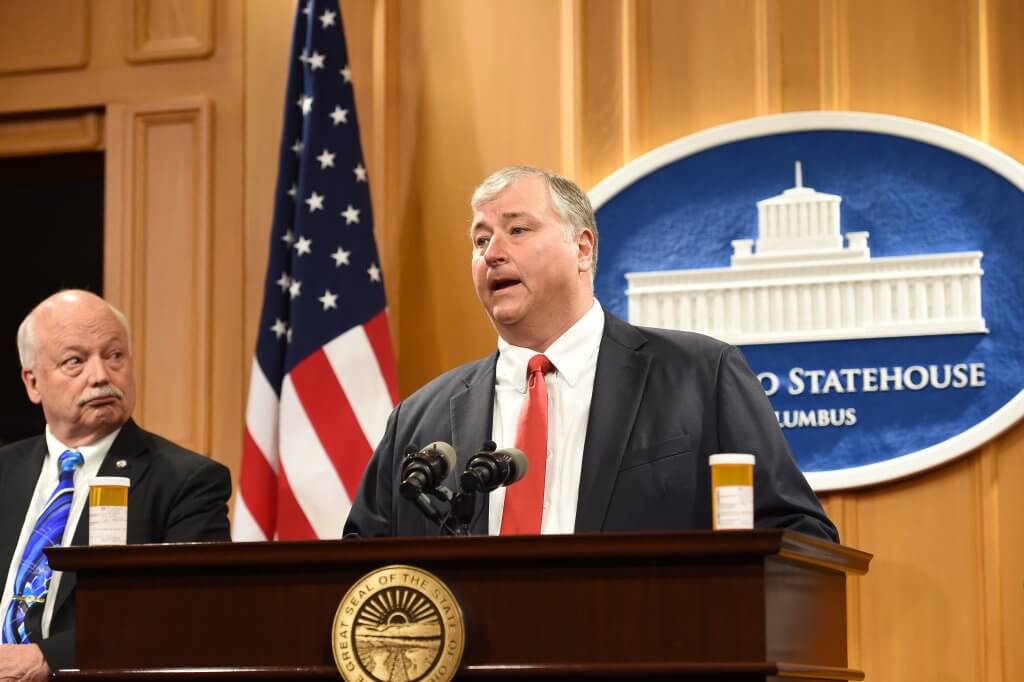2 House Speakers in Scandals Involving Energy Giants — What Does It Mean for Md.?

Item: The U.S. Department of Justice announces Friday that Commonwealth Edison, the leading electric utility in Illinois, will pay a $200 million fine for attempting to bribe the state’s Speaker of the House, Michael Madigan (D).
Item: Ohio House Speaker Larry Householder (R) and four political operatives are arrested Tuesday and charged in a federal criminal complaint that an energy company paid them $61 million to get a $1.5 billion nuclear bailout from taxpayers.
Two powerful state legislators and their associates. Two giant energy companies. Two statehouses where high-stakes debates over energy policy are commonplace.
What do these developments have to do with Maryland? And are there implications for ratepayers — and for policy, politics and jurisprudence — here?
At a minimum, said state Sen. Brian J. Feldman (D-Montgomery), the vice chairman of the Finance Committee, which sets energy policy, the scandals in Illinois and Ohio are a cautionary tale for Maryland, “where there’s a lot of money floating around this industry.”
“It’s a wake-up call yet again about money in politics,” Feldman said. “It reinforces a theme that we’ve dealt with in Maryland for the last couple of years. And as policymakers, we have to be particularly careful.”
Both energy companies involved in the scandals have ties to Maryland.
Commonwealth Edison, the Chicago-based utility, is owned by Exelon — the parent company of Baltimore Gas & Electric Inc., Pepco and Delmarva Power, three of the four investor-owned utilities in the state.
FirstEnergy Solutions, the Akron, Ohio, company involved in the Householder scandal, is a subsidiary of FirstEnergy Corp. — which owns Potomac Edison, Maryland’s fourth investor-owned electric utility.
A spokeswoman for the U.S. attorney’s office in Baltimore did not respond to a query Tuesday about whether the Maryland office had been apprised of the investigations in the Midwest ahead of the announcements or whether the investigations could extend to Maryland.
On Friday, Commonwealth Edison was cited by John R. Lausch Jr., the U.S. attorney for Northern Illinois, for its role in “a years-long bribery scheme” surrounding Madigan and others in his political orbit.
Madigan, who has served as speaker since 1987 and doubles as Illinois Democratic chairman, was not charged by federal prosecutors in the scandal. But a Justice Department statement said “ComEd admitted it arranged jobs, vendor subcontracts, and monetary payments associated with those jobs and subcontracts, for various associates” of Madigan “to influence and reward the official’s efforts to assist ComEd with respect to legislation concerning ComEd and its business.”
Lausch’s office also hinted that the investigation into Madigan and corporate attempts to influence the legislative process are ongoing. Madigan — a protean figure of unmatched power in Illinois politics, whose tenure and influence has largely paralleled that of Maryland Senate President Emeritus Thomas V. Mike Miller Jr. (D-Calvert) — has skirted legal jeopardy throughout his long career, despite intense speculation through the years in Springfield and Chicago over his potential vulnerabilities.
The U.S. attorney’s statement said ComEd’s attempts to influence Madigan and the legislative process ran from 2011 to 2019, and yielded about $150 million in benefits to the utility. Among the measures that Madigan successfully pushed was legislation to change the way gas and electric utility rates are set in Illinois.
“In addition to the jobs and contracts [given to Madigan associates], ComEd further admitted that it undertook other efforts to influence and reward [Madigan], including by appointing an individual to ComEd’s Board of Directors at the request of [Madigan]; retaining a particular law firm at the request of [Madigan]; and accepting into the company’s internship program a certain amount of students who resided in the Chicago ward where [Madigan] was associated,” the DOJ statement said.
ComEd has agreed to pay a $200 million fine and will defer prosecution for three years, the government said. At the end of the three-year period, if the utility has satisfied certain conditions and continues to cooperate with federal investigators, a pending criminal charge against ComEd will be dropped.
Big-time players in Annapolis
So what does all this have to do with Maryland?
Start with the utility’s $200 million fine. In a statement, Exelon, ComEd’s parent, has pledged that the cost will not be borne by ratepayers. In other words, just because the utility has screwed up, electric rates are not going to go up.
“The conduct at issue in the agreement relates only to ComEd, and the agreement does not contain any allegation of misconduct by Exelon or Exelon Generation,” the company said.
Outwardly, that appears to protect Exelon’s customers in Maryland — at BG&E, Pepco and Delmarva Power.
Tori Leonard, a spokeswoman for the Maryland Public Service Commission, which regulates utilities in the state, said Exelon’s three entities in Maryland come before the PSC seeking rate hikes separately, which are granted based on their performance and market conditions, among other factors.
Exelon’s affiliates, Leonard said, “are subject to the jurisdiction of whatever state commission they operate in.”
But even across a giant energy conglomerate a $200 million economic hit is not insignificant, and could affect business up and down the company. In Maryland, Exelon operates the Calvert Cliffs Nuclear Power Plant in Lusby and the Conowingo Hydroelectric Generating Station in the Susquehanna River, among other facilities.
Then, there is the stain of pay-to-play lobbying activity on display in Illinois.
In the wake of the settlement last week with the DOJ, Exelon CEO Christopher M. Crane said the company was imposing new mandatory policies regarding how employees, contract lobbyists and political consultants interact with government officials — not just in Illinois, but in every other jurisdiction where the company has holdings. Employees and contractors will undergo training on the new policies over the next few months, the company said.
“We are committed to maintaining the highest standards of integrity and ethical behavior,” Crane said. “In the past, some of ComEd’s lobbying practices and interactions with public officials did not live up to that commitment.”
He added that the ComEd employees and contractors “who orchestrated this misconduct” are no longer working for the utility.
Energy lobbying in Maryland is big business — and Exelon and its affiliates are at the forefront.
In some cases, the utilities and their hired guns have a line into powerful lawmakers who set energy policy, and entities like BG&E and Pepco are among the biggest spenders every General Assembly session.
According to figures provided by the Maryland State Ethics Commission, which monitors lobbying activity in Annapolis, Pepco spent $284,473 lobbying state government between Nov. 1 and April 30; BG&E spent $246,869; and Exelon spent $179,808.
The utilities employ some of the top government relations firms in Annapolis in addition to paying their own in-house lobbyists.
Last year, the investor-owned utilities in Maryland were pushing hard for the same changes in the way annual rate hikes are determined that passed in Illinois years ago — legislation that figured in the DOJ action against ComEd.
The bill favored by the utilities would have enabled the Maryland Public Service Commission to calculate ratepayer costs by considering a number of factors not traditionally used, including looking ahead to the strength of energy markets, the utilities’ financial stability, and external forces like weather and climate. When the Senate Finance Committee held a hearing on the legislation in February of 2019, BG&E treated members of that panel and the House Economic Matters Committee — the principal energy committee in the lower chamber — to dinner at an Annapolis steakhouse the very same evening.
The bill wound up stalling in the Senate after passing through the House. But last summer, the PSC — which had opposed the bill during the 2019 legislative session — announced that it would begin to implement the change in rate hike calculations without any legislation.
The utilities’ influence in Maryland isn’t limited to legislation.
When Catherine E. Pugh, a former member of the Senate Finance Committee who was tight with certain Annapolis lobbyists, was elected mayor of Baltimore in 2016, former BG&E CEO Calvin Butler served as a prominent member of her transition team.
Pugh is now serving in federal prison for not reporting income on her “Healthy Holly” books and other scandals; Butler is now a senior vice president of Exelon and CEO of Exelon Utilities.
And while BG&E does not appear to have purchased any “Healthy Holly” books, the Baltimore Brew reported that a member of the Exelon board of directors purchased $3,600 worth of the books through Associated Black Charities.
Uh oh, Ohio
The indictment Tuesday of Householder, the Republican House speaker, and four of his political associates, is “likely the largest bribery and money-laundering scheme ever in the state of Ohio,” David M. DeVillers, U.S. attorney for the Southern District of Ohio, said at a Tuesday afternoon news conference.
The criminal complaint alleges that FirstEnergy Solutions of Akron — now known as Energy Harbor Corp. after emerging from bankruptcy earlier this year — worked to save its failing nuclear plants by funneling $61 million into Generation Now, a 501(c)(4) “dark money” group controlled by Householder.
The money, prosecutors say, was used to build Householder’s political operation and aid GOP candidates in advance of his successful run for speaker in 2019; to pass a billion-dollar “bailout” that saved from closure two failing nuclear power plants in Ohio affiliated with FirstEnergy of Akron; to personally benefit Householder and his associates; and to fend off a petition drive to defeat the nuclear bailout legislation.
FirstEnergy Corp., its leaders and its spun-off companies were not charged Tuesday. The company’s stock price fell 17% Tuesday, to $354.25 a share.
But DeVillers, the U.S. attorney, said the investigation would continue — and in a more public way.
“We are not done with this case,” he said. “There were things we couldn’t do before. People we couldn’t interview. People we couldn’t subpoena. Documents and search warrants we couldn’t execute.
“As of this morning there are a lot of FBI agents knocking on a lot of doors asking a lot of questions, serving lots of subpoenas. That’s going to go on for days.”
Like Exelon and its affiliates, FirstEnergy Corp. has an A team of registered lobbyists in Annapolis, and reported spending $115,000 on lobbying activity in Maryland between Nov. 1 and April 30. An affiliate, First Energy Service Co., reported spending $75,000.
This article includes reporting from Marty Schladen of the Ohio Capital-Journal.




 Creative Commons Attribution
Creative Commons Attribution